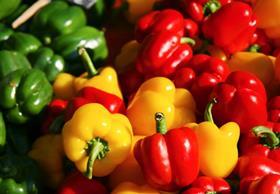
Peppers are a product that have been at the forefront of the war on price, and the so-called ‘big four’ retailers still have the traffic-light packs on sale at no more than £1 at the time of going to press.
This price point has been held even through a tricky period of transition, from Dutch supply to Spanish, with the latter nation having experienced extremely warm weather in August, causing a delay of a “good couple of weeks” according to some importers on its supply to the UK market and elsewhere.
Lee Stiles, of the Lea Valley Growers Association (LVGA), says: “Price is the biggest talking point in the category. The traffic light packs have come down in price considerably, and some growers are considering other crops as a result; for example, going from block peppers to pointy peppers.”
Mel Miles, head of agronomy at prepared produce firm Freshtime, paints an even bleaker picture. He tells FPJ: “In an ideal world, we should be excited about peppers as a tasty, healthy, fresh ingredient that adds value and interest to our range of food-to-go products. However, our growers are talking about the impacts of pricing and commodity production. There is a sense that the total hectarage of UK peppers will fall as the wider retail price declines. It is feared that commodity pepper production is on a race to the bottom in terms of retail price, and that, when this is coupled with the current Euro exchange there can only be a rise in the scale of imported peppers.”
Rebecca Quiney, who heads up UK-based pepper supplier Wellpak’s salad division, echoes the latter duo’s thoughts on price, and also raises another challenge faced by the industry: “Supermarkets naturally want the lowest price possible without compromising on quality, so that’s always at the forefront of suppliers’ minds,” she says. “But another relatively new challenge is the introduction of a minimum weight. Packs of threepeppers now need to match 500g per pack.”
LVGA members have finished their pepper supply to the UK market this week (w/c 16 November), with the season set to start again in January. The high temperatures Spain experienced at the back end of the summer meant crops struggled to set fruit, and the fruit that did make it off the plants was apparently of very poor quality, rendering export nigh-on untenable, according to Pleun van Malkenhorst, of Rainbow Growers. Stiles says that for those of his members who do bring peppers in from the likes of Spain and Morocco, “things have been okay so far”.
However, Miles notes that in recent years, Spain has seen some very cold winters that have reduced availability and triggered quality problems. He adds: “I believe the next six months could highlight the importance of long-term supply chain relationships – those companies that work on a transactional basis may be in for a shock if the weather is cold again. The wider pool of European commodity volume may also be affected by the diversion of Israeli peppers towards the Russian market.” As for how the industry goes about boosting pepper production, Stiles notes: “As soon as some slippery chef uses them, consumption goes up pretty quickly.
“It’s a staple of any salad, and we’ve helped launch a pepper cookbook recently to increase usage ideas, especially in winter. Education is key, and it’s helping people get over the ‘I don’t know what to do with it’ hurdle.”
Stiles also raised his concerns about the lack of penetration smaller snack-sized peppers have made on the UK market. He tells FPJ: “They are taking a lot longer to become popular than expected. Initially, we thought they would catch on for things like kids’ lunchbox snacks. They work elsewhere, but they’ve been a real slow-burner here.”
When pressed on why this might be the case, Stiles suggests: “We consume differently here, and people have their time pressures and their shopping habits, so maybe they don’t go out of their way to explore new options. But the retailers can help with this, using more prominent displays and providing better information, and so on.”



